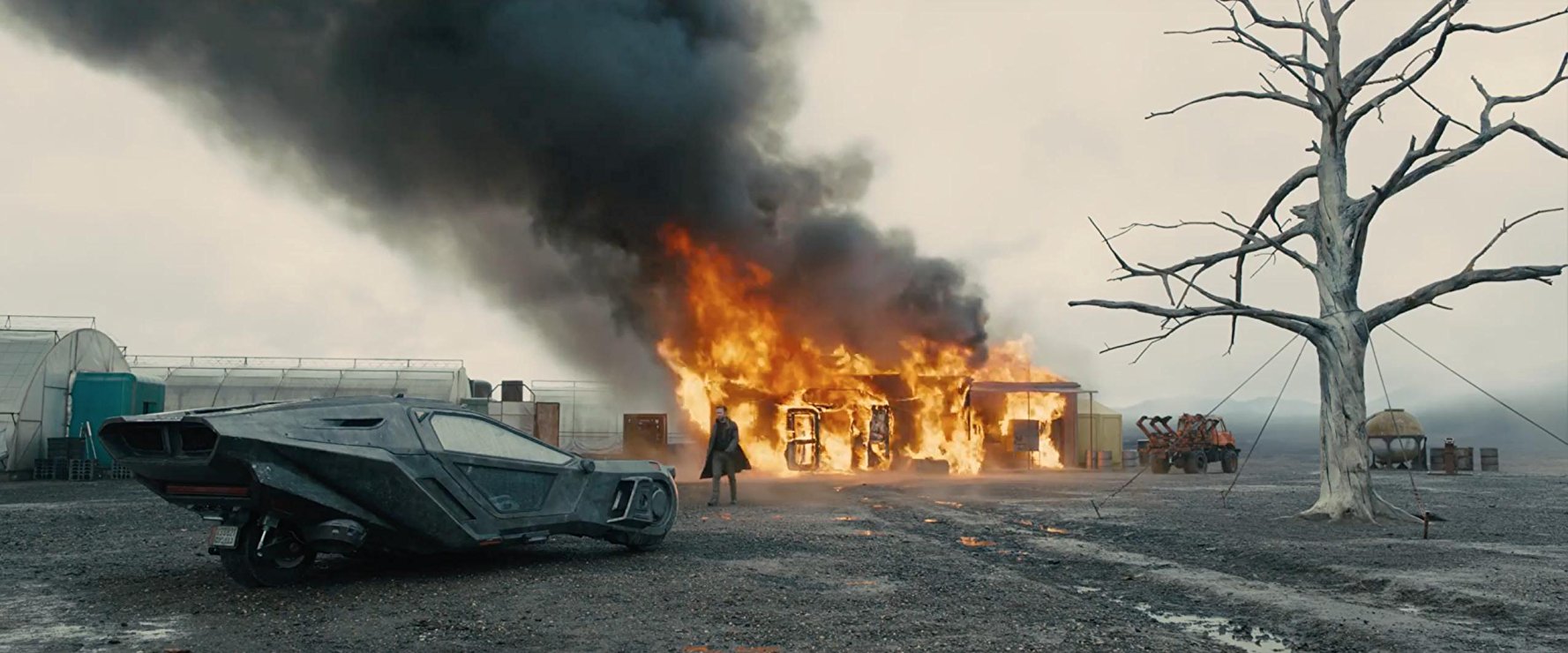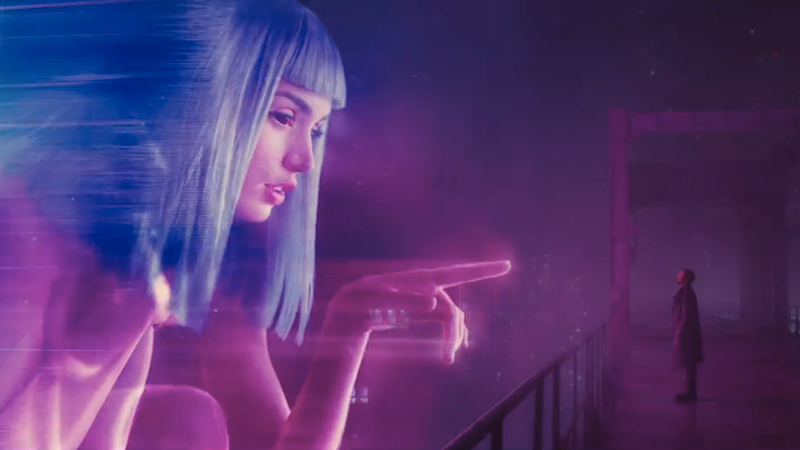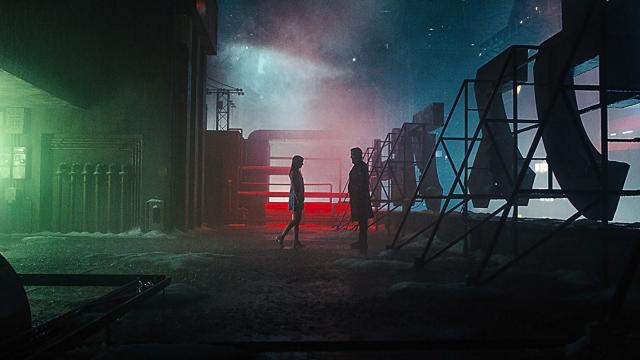Image: Warner Bros./Alcon Entertainment
Many different versions of Blade Runner have been released since the original film was released 35 years ago. Now, with the sequel Blade Runner 2029 coming out October 6, the question of which is the “right” one looms large — so we spoke to sequel writers Michael Green (American Gods) and Hampton Fancher (cowriter of the original) about the old film, the new film, and the one Blade Runner fan they wrote it for.
Gizmodo: There are parts of the movie that seemed related to the Blade Runner sequel Ridley Scott had talked about making himself for years. For example, that scene with the tree and the farm that we’ve Scott mentioned something similar as his ideal first scene for a sequel, but with Deckard instead of K (Ryan Gosling). How much of Scott’s original ideas made their way into the final script?
Michael Green: I’m going to give you a set-up for that answer that’s going to make you very happy. I’m just going to explain that that opening scene has a long, storied history. So don’t let [Hampton] off the hook until he gives you that story.
Hampton Fancher: At one point, writing the first Blade Runner — quite a bit into it — I’d finished a few drafts. And we were working together, and we already had an opening, it was the interrogation of Leon. But then Ridley said to me, “What did Deckard do before he was retiring… Nexus 6s?” And I said, “I suppose he was retiring Nexus 2s, or 1s.” He said, “I like that idea.” Then he said, “What if he’s supposed to retire a poor, misbegotten Nexus 0, 1, 2?” And I said, “Yeah, I like that idea.”
And then Scott described a little cabin. With a burner. A little hotplate. And a pot. And he said “Soup is on that, boiling.” And I loved that idea. With just those words… he really conveyed to me an atmosphere and a character so that I, actually, went home that night and wrote a scene. And I came back the next day and watched him read it. And I could see he loved it. And I was thrilled. But it didn’t go into the movie.
But I always liked that scene, and so I wrote a short story about that — not about that, really, but about the circumstance. And I called the character “Kard.” K-A-R-D. That’s the guy who was interrogating Sapper Morton (Ed’s note: Dave Bautista’s character in Blade Runner 2049). And there it was. So it came full circle. So that was there and it started me off on the project of Blade Runner 2. So it goes back a long way.
Green: Aren’t you glad you asked?
Fancher: Is he being facetious?
Green: Nope, it’s a great story. I love it.
Fancher: Memories…

Image: Warner Bros/Alcon Entertainment via YouTube
Gizmodo: There are a number of cuts of the original Blade Runner, including different endings. Did you have to choose which version you were making the sequel to?
Green: No, it’s one of the great ideas of the film — that the subject of subjectivity is woven through the story. That the search for authenticity is the character’s journey, and it is also the journey of a fan. So, going into a potential sequel was just a recognition that those are chief among the themes at play.
And after that, you get to fanboy out amongst everyone else working on the film, learn what their favourite version is and why. I got to ask Ridley Scott that. I got to ask Denis [Villeneuve, the sequel’s director] that. I got to argue with Denis about that — and he respects opinions, because there’s no right or wrong. People ask often, “Which version should I watch if I haven’t seen it?” I say the easiest answer is, “Whichever you can watch tonight.”
Gizmodo: It’s a question people have also been asking me. I really don’t have an answer.
Green: The truth is, it doesn’t matter. They’re all interesting in their own right. I think, unfortunately, some people have told me they haven’t watched it because the fear what they’re viewing is not “correct.” It’s unfortunate because any of them are worth seeing. But also because, by not being sure, you’re entering into the conversation of Blade Runner.
Gizmodo: There are obvious reasons to set the sequel as far into the future as it is, especially since we’re decades from when the first film was made. But what have you done with that 30-year gap? The movie tells you a little bit about what happened, but that’s a long time to leave up to the imagination.
Fancher: I don’t agree with that, because, if we were going to talk about something that happened to me 30 years ago, and then catch up with me right now, who cares about the 30 years in between? I lived. That’s all.
[The time gap] took its toll on the character Deckard. Things happened to him. But that’s another story. And it’s not a very interesting story, possibly. It’s not germane. So, it’s up to you, your imagination, what happened historically to that guy.
Green: And it was very important to just focus on telling the story we wanted to tell. Everything else… well, you only needed to know what you needed to know.
Fancher: It wasn’t a deal-breaker, in other words. In terms of storyline.
Gizmodo: I feel like Blade Runner 2049 was full of stories, all of which are interesting, and all of which could have been a movie themselves. How would you describe the single story you wanted to tell?
Green: Ideally as singular. I don’t think that they are separate stories. They are not vignettes independent of each other. There are no parts of the story that could be removed and you still got a whole piece. So there is a puzzle at work. And if people give up their trust, they might enjoy solving it with us.
Gizmodo: There are a lot of characters in this film, and many of them are women. Outside of Deckard, K, and Jared Leto’s Niander — almost everyone else is a female character. Was there a reason it’s so female-heavy?
Green: I actually don’t entirely agree. There aren’t that many characters. It’s not an overpopulated film. None of us wanted to go into the classic Sunday TV, classic Game of Thrones style where you’re trying to remember who that person is and what their involvement is again. It was purely tight casting, with everyone having a pretty discrete role. That was important.
The answer to the second part of your question is we wanted to represent women in the world. We wanted to see what the places, in a film about people’s social roles, we wanted to see those social roles and how they find and show their strengths in them. And we have several women who are — each in their own way — very, very different. [And] very, very strong. And some are given strength, some fight for strength, some are feeling their strength from their surroundings, in very clever and strong ways. But mostly it’s just that strong women characters are great characters and we want lots of them in all our films.

Image: Warner Bros/Alcon Entertainment via YouTube
Gizmodo: Were you worried about adding a new chapter to Blade Runner, something that fans love, but feel they know all about? When you were writing the sequel, was a concern how fans would react?
Fancher: None at all. Nothing. I don’t know about anybody else, but… the only thing I thought about in terms of fans was Ridley. I knew he was a fan, and I was a fan of his. I was writing for Ridley. Or I would realise after the fact that I was doing that. Although we would need to discuss it. But yeah, I wanted him to be the sympathetic ear I got.
[This interview has been lightly edited for length and clarity.]
